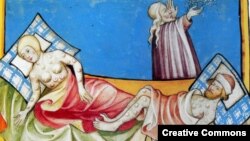While the Black Death of the 14th century killed off about 30 percent of the population of Europe, the survivors and their descendants may have benefitted, according to new research.
In fact, survivors “lived significantly longer and were healthier than people who lived before the epidemic struck in 1347,” according to research by University of South Carolina anthropologist Sharon DeWitte.
Some of the survivors of the Black Death, which was caused by the bacteria Yersinia pestis, lived to be 70 and even 80 years-old, according to the research.
The improved health may have been passed all the way down people of European descent today.
“I think it is safe to say that descendants might be reaping the benefits of the Black Death in terms of immune competence or disease resistance - though this is a hypothesis that requires testing,” said DeWitte in an email to VOA. “What can be done is an examination of human genetic variation before and after the Black Death and in living people in an effort to find genetic variants that confer immune benefits and that increased in frequency after the Black Death.”
For the past decade, DeWitte has studied the skeletal remains of more than 1,000 men women and children who lived before, during and after the deadly outbreak from 1347 to 1351.
The skeletons all came from London cemeteries and are “exceedingly rare,” said DeWitte in a statement, adding that there are very few cemetery samples linked to the 14th century plague. It is estimated that the Black Death wiped out nearly half of London’s population. In total, the disease killed between 75 and 100 million Europeans.
DeWitte determined the sex and age at death of the remains, taking notice of “porous” lesions” and dental health, both indicative of overall health.
What she found was that the Black Death targeted the frail of all ages and that survivors experienced better overall health and longer lives post outbreak. However, surviving the Black Death did not mean a guarantee of health over a lifespan, but “revealed a hardiness to endure disease, including repeated bouts of plague.”
Finally, according to the research, the plague “either directly or indirectly, very powerfully shaped mortality patterns for generations after the epidemic ended.”
“Knowing how strongly diseases can actually shape human biology can give us tools to work with in the future to understand disease and how it might affect us,” DeWitte said in a statement, adding that the “Black Death was a single iteration of a disease that has affected humans since at least the 6th century Plague of Justinian” from 541 to 542 AD.
“Genetic analysis of 14th century Y. pestis has not revealed significant functional differences in the ancient and modern strains,” DeWitte says. “This suggests that we need to consider other factors such as the characteristics of humans in order to understand changes in the disease over time.”
DeWitte’s findings were published in the journal PLOS ONE.
In fact, survivors “lived significantly longer and were healthier than people who lived before the epidemic struck in 1347,” according to research by University of South Carolina anthropologist Sharon DeWitte.
Some of the survivors of the Black Death, which was caused by the bacteria Yersinia pestis, lived to be 70 and even 80 years-old, according to the research.
The improved health may have been passed all the way down people of European descent today.
“I think it is safe to say that descendants might be reaping the benefits of the Black Death in terms of immune competence or disease resistance - though this is a hypothesis that requires testing,” said DeWitte in an email to VOA. “What can be done is an examination of human genetic variation before and after the Black Death and in living people in an effort to find genetic variants that confer immune benefits and that increased in frequency after the Black Death.”
For the past decade, DeWitte has studied the skeletal remains of more than 1,000 men women and children who lived before, during and after the deadly outbreak from 1347 to 1351.
The skeletons all came from London cemeteries and are “exceedingly rare,” said DeWitte in a statement, adding that there are very few cemetery samples linked to the 14th century plague. It is estimated that the Black Death wiped out nearly half of London’s population. In total, the disease killed between 75 and 100 million Europeans.
DeWitte determined the sex and age at death of the remains, taking notice of “porous” lesions” and dental health, both indicative of overall health.
What she found was that the Black Death targeted the frail of all ages and that survivors experienced better overall health and longer lives post outbreak. However, surviving the Black Death did not mean a guarantee of health over a lifespan, but “revealed a hardiness to endure disease, including repeated bouts of plague.”
Finally, according to the research, the plague “either directly or indirectly, very powerfully shaped mortality patterns for generations after the epidemic ended.”
“Knowing how strongly diseases can actually shape human biology can give us tools to work with in the future to understand disease and how it might affect us,” DeWitte said in a statement, adding that the “Black Death was a single iteration of a disease that has affected humans since at least the 6th century Plague of Justinian” from 541 to 542 AD.
“Genetic analysis of 14th century Y. pestis has not revealed significant functional differences in the ancient and modern strains,” DeWitte says. “This suggests that we need to consider other factors such as the characteristics of humans in order to understand changes in the disease over time.”
DeWitte’s findings were published in the journal PLOS ONE.











